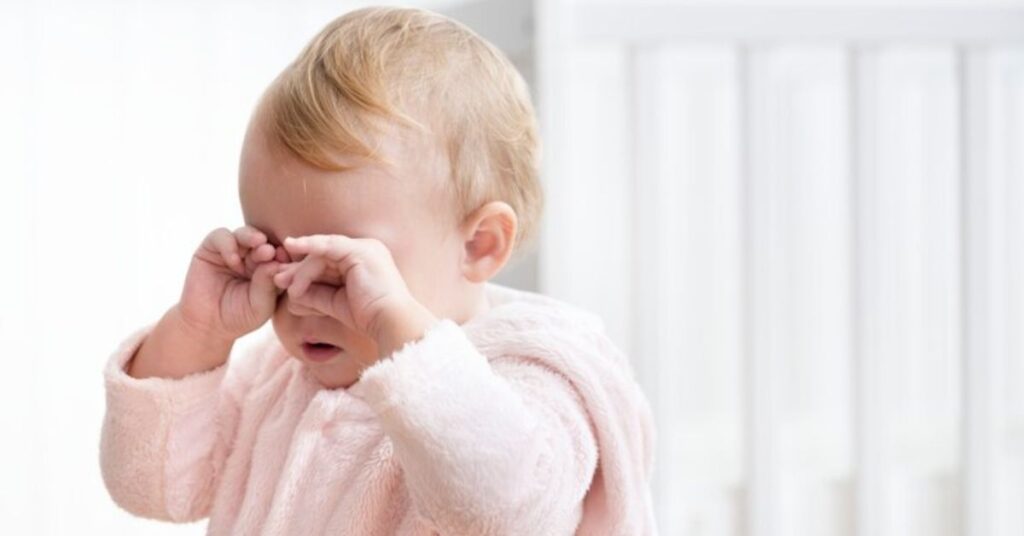Last Updated on February 2, 2024 by Muhammad Sohaib
Hey there, curious parents and caregivers!
Have you ever noticed your little bundle of joy rubbing those tiny eyes with their adorable little hands?
It’s not just a random habit – there’s a fascinating reason behind it that adds to the cuteness of your little one.
Let’s explore the mystery of why babies rub their eyes?
Understanding Infant Eye Rubbing
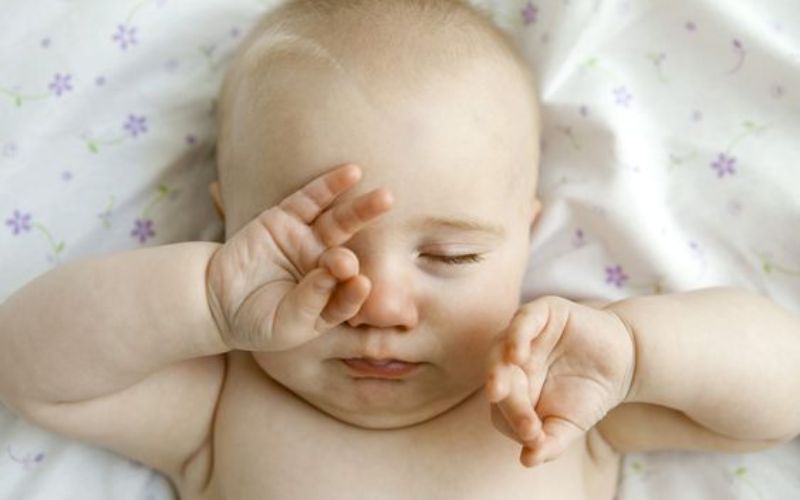
Infant eye rubbing refers to the act of a baby rubbing their eyes with their hands or fingers. This behavior is often observed in babies of varying ages, from newborns to toddlers.
While it may appear random or inconsequential, there are specific factors that contribute to why babies rub their eyes.
Factors Contributing to Infant Eye Rubbing
1. Fatigue and Sleepiness

Babies, especially in the early stages of development, have delicate sleep schedules. As they exert energy throughout the day, their bodies and minds require sufficient rest for proper growth and development. When babies start feeling tired or sleepy, they may exhibit various cues to communicate their need for rest, and one common behavior is rubbing their eyes.
Why Babies Rub Their Eyes When Tired or Sleepy?
Biological Signal: Babies may rub their eyes as a biological response to fatigue. When they become tired, their bodies release signals such as increased levels of melatonin, a hormone associated with sleep. Rubbing their eyes could be a natural instinctive response indicating the body’s readiness for sleep.
Comfort and Soothing: Rubbing the eyes can be a comforting and self-soothing action. The gentle pressure on the eyes may provide a calming sensation, helping babies transition into a more relaxed state conducive to sleep.
Association with Bedtime Routine: Over time, babies develop associations between certain behaviors and bedtime routines. If caregivers consistently put them to sleep after they rub their eyes, it becomes a learned behavior for signaling the need for sleep.
Eye Fatigue: Continuous exposure to stimuli, such as visual stimulation from toys or screens, can lead to eye fatigue in babies. Rubbing their eyes may be a response to alleviate strain and tiredness in the eyes, signaling that they are ready to close their eyes and rest.
Developmental Sleep Patterns: Babies go through different sleep patterns as they grow. The transition between sleep cycles can be eased by self-soothing actions like rubbing their eyes, which helps them settle into a deeper sleep phase.
Understanding and recognizing these cues can assist caregivers in creating a conducive sleep environment for the baby.
Establishing consistent bedtime routines, providing a comfortable sleeping space, and responding promptly to signs of tiredness can contribute to better sleep patterns for the baby and a more rested and contented infant overall.
2. Eye Irritation

Another common reason for babies rubbing their eyes is the presence of eye irritation. This discomfort can stem from various factors, including environmental elements, allergens, or dry eyes. Babies instinctively rub their eyes in an attempt to alleviate the discomfort they may be experiencing.
Why Babies Rub Their Eyes Due to Eye Irritation?
Sensitivity to Environmental Factors: Babies have delicate and developing eyes that can be sensitive to environmental factors such as dust, smoke, or pollutants. When exposed to these irritants, babies may rub their eyes as a reflexive response to minimize the discomfort caused by the irritants.
Allergies: Allergic reactions to substances like pollen, pet dander, or certain foods can lead to eye irritation. Rubbing the eyes may be an attempt by the baby to relieve the itching or irritation associated with allergies.
Dry Eyes: Lack of sufficient tear production or exposure to dry air can result in dry eyes, causing discomfort and a gritty feeling. Babies, unable to articulate their discomfort verbally, may resort to rubbing their eyes to soothe the dryness.
Foreign Particles: Babies are naturally curious and may come into contact with foreign particles that can irritate their eyes. Rubbing the eyes is a way to remove or alleviate the irritation caused by these particles.
Light Sensitivity: Bright lights, including sunlight or artificial lighting, can be harsh on a baby’s developing eyes. Excessive exposure to light may lead to eye discomfort, prompting babies to rub their eyes as a response to the sensitivity.
Teething-Related Irritation: Teething can cause increased drooling, and the moisture around the mouth can sometimes lead to skin irritation, including around the eyes. Babies may rub their eyes to address this discomfort indirectly associated with teething.
Recognizing signs of eye irritation is crucial for caregivers to address the underlying cause and provide appropriate care.
Ensuring a clean and dust-free environment, addressing potential allergens, and consulting with a pediatrician if irritation persists can contribute to the baby’s eye health and overall comfort.
3. Sensitivity to Light
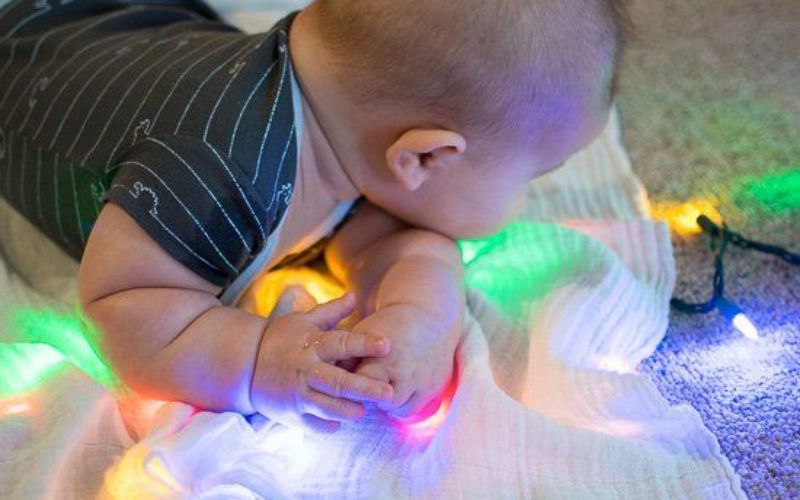
Babies, especially in their early stages of development, have eyes that are more sensitive to light compared to adults. The sensitivity is due to the immaturity of their eye structures and the fact that their eyes are still adapting to the external environment. Rubbing their eyes can be a natural response when babies encounter bright lights, especially if there are sudden changes in lighting conditions.
Why Babies Rub Their Eyes Due to Sensitivity to Light?
Developing Eyes: The eyes of newborns and infants are still developing, and their pupils are not yet able to constrict and dilate as efficiently as those of adults. This makes their eyes more susceptible to the intensity of light.
Limited Eye Defense Mechanisms: Babies have limited mechanisms to protect their eyes from harsh light. Unlike adults, they may not be able to squint or shield their eyes effectively. Rubbing their eyes becomes an instinctive way to create a physical barrier against the brightness.
Sudden Changes in Lighting Conditions: Babies may be exposed to sudden changes in lighting conditions, such as moving from a brightly lit area to a darker one or vice versa. The adjustment process for their sensitive eyes can lead to discomfort, prompting them to rub their eyes to reduce the intensity of light.
Overstimulation: Bright lights, especially in stimulating environments like shopping malls or busy spaces, can be overwhelming for babies. Rubbing their eyes may be a way to cope with sensory overload and reduce the visual stimulation they are experiencing.
Sleep Regulation: Exposure to natural light helps regulate circadian rhythms and sleep-wake cycles. However, excessive exposure to bright light, especially when it’s time for the baby to rest, may lead to discomfort. Rubbing their eyes can be a sign that they are trying to create a dimmer environment to encourage sleep.
Adjustment to External Stimuli: Babies are still learning to adjust to the external world and its various stimuli. Rubbing their eyes might be a part of their exploration and adaptation to the sensations of light around them.
Caregivers can support babies by providing a comfortable and shaded environment when they anticipate exposure to bright lights.
Understanding the baby’s cues and responding by adjusting lighting conditions can contribute to a more comfortable and less overstimulated experience for the baby.
If light sensitivity persists or seems severe, consulting with a pediatrician is advisable to rule out any underlying issues.
4. Teething Discomfort

Teething is a natural process in a baby’s development when their first set of teeth begins to emerge through the gums. This stage can bring about discomfort and irritability for many infants. One interesting aspect is that teething discomfort may not be limited to the mouth alone; it can extend to various parts of the face, including the eyes. Rubbing their eyes during teething can be a way for babies to seek relief from the discomfort associated with this process.
Why Babies Rub Their Eyes Due to Teething Discomfort?
Referred Pain: Teething pain doesn’t always manifest exclusively in the gums. Babies may experience referred pain, meaning discomfort in one area (gums) can be felt in another area (such as the eyes or face). Rubbing their eyes may be an instinctive response to alleviate this referred discomfort.
Increased Salivation: Teething often leads to increased drooling as the baby’s body responds to the teething process. Excess saliva around the mouth can sometimes irritate the skin, including the area around the eyes. Rubbing the eyes may be an attempt to address this secondary discomfort.
Jaw Tension: The process of teething can create tension in the jaw and facial muscles. Rubbing the eyes may be a way for babies to release some of this tension and find a sense of relief from the overall discomfort they are experiencing.
Self-Soothing Mechanism: Babies engage in self-soothing behaviors when they are uncomfortable, and teething discomfort can be distressing for them. Rubbing their eyes may provide a comforting sensation and act as a self-soothing mechanism to cope with the overall uneasiness associated with teething.
Distraction from Gum Discomfort: Rubbing the eyes could serve as a distraction from the more direct pain in the gums. By focusing on another part of their face, babies may temporarily redirect their attention away from the discomfort in their mouths.
Association with General Discomfort: Teething discomfort can lead to a general sense of unease and irritability. Rubbing their eyes may be part of a repertoire of behaviors that babies exhibit when they are overall uncomfortable due to teething.
Understanding and addressing teething discomfort can involve providing teething toys, using chilled teething rings, or applying soothing gels to the gums.
Consulting with a pediatrician can help ensure that caregivers are using safe and effective methods to alleviate teething-related discomfort.
5. Self-Soothing Mechanism
Babies engage in self-soothing behaviors as a way to comfort themselves when they experience stress, discomfort, or even unfamiliar situations. Rubbing their eyes is a common self-soothing mechanism observed in infants. The gentle pressure on the eyes provides a comforting sensation that helps them cope with various stresses or discomforts.
Why Babies Use Rubbing Their Eyes as a Self-Soothing Mechanism?
Comforting Sensation: The gentle pressure created by rubbing their eyes can generate a soothing and calming sensation for babies. This physical contact with their own face becomes a source of comfort, helping them regulate their emotions and ease any distress they may be feeling.
Familiarity and Security: Babies find comfort in familiar actions and sensations. Rubbing their eyes becomes a repetitive and familiar behavior that provides a sense of security. It’s a physical activity that they can control and predict, contributing to a feeling of reassurance.
Connection to Sleep: Self-soothing behaviors, such as rubbing their eyes, are often associated with the transition to sleep. Babies learn patterns and routines quickly, and the act of rubbing their eyes may become a cue for them that it’s time to wind down and prepare for sleep.
Emotional Regulation: Infants are still developing their ability to regulate their emotions. Rubbing their eyes may serve as a form of emotional regulation, helping them cope with feelings of anxiety, frustration, or overstimulation.
Mimicking Comforting Actions: Babies learn by observing the actions of those around them. If they witness caregivers or older siblings rubbing their eyes as a calming gesture, they may mimic this behavior as a way to self-soothe.
Transitioning Between Activities: Rubbing their eyes might also be a way for babies to transition between activities. It can be a method of self-soothing as they move from a period of play or interaction to a quieter and more relaxed state.
Tactile Exploration: Babies explore their world through touch. Rubbing their eyes may be a part of their tactile exploration as they discover the sensations and textures of their own face and eyes.
Encouraging healthy self-soothing behaviors is generally beneficial for a baby’s emotional development.
However, caregivers should also be attentive to other cues and ensure that the rubbing of eyes is not a sign of an underlying issue, such as eye irritation or discomfort.
Creating a calm and consistent bedtime routine can further support the baby’s self-soothing mechanisms and contribute to overall emotional well-being.
6. Exploration and Discovery
Babies are naturally curious and learn about their environment through various sensory experiences, including touch. Rubbing their eyes can be considered a form of self-discovery as they become aware of their facial features and learn how to manipulate them.
Why Babies Engage in Eye Rubbing as Exploration and Discovery?
Tactile Exploration: Infants are born with a strong desire to explore the world around them through touch. Rubbing their eyes allows them to engage in tactile exploration of a highly sensitive and easily accessible part of their face. The sensation of their hands against their eyes provides valuable information about the texture and movement of their skin.
Developing Motor Skills: Babies go through rapid motor skill development in their early months. The coordinated movement required to rub their eyes involves the use of their hands and fingers. Engaging in this activity contributes to the development of their fine motor skills and hand-eye coordination.
Body Awareness: As babies grow, they gradually develop a sense of body awareness. Rubbing their eyes helps them become more conscious of their facial features and the physical boundaries of their body. It’s a way for them to understand how their hands and eyes are connected.
Cause and Effect Learning: Babies are constantly learning about cause and effect relationships. Rubbing their eyes allows them to observe the immediate consequences of their actions. They may notice changes in the sensations or visual stimuli when they engage in this behavior, contributing to their understanding of cause and effect.
Experimentation with Facial Features: The face is a prominent and easily accessible area for babies to explore. Rubbing their eyes may be a form of experimentation with facial features, and they may discover that this action elicits certain responses or feelings.
Sensory Stimulation: Babies are drawn to activities that provide sensory stimulation. Rubbing their eyes may create different sensations, such as pressure on the eyelids or changes in visual input, adding to the array of sensory experiences they encounter.
Curiosity about Body Parts: Babies often exhibit curiosity about their own body parts. Rubbing their eyes can be part of this exploration as they discover the feel and movement of their eyes, eyelids, and surrounding facial areas.
Understanding that eye rubbing can be a natural part of a baby’s exploration and self-discovery helps caregivers encourage safe and appropriate exploration.
Providing age-appropriate toys, supervised tummy time, and opportunities for sensory exploration can further support a baby’s developmental journey.
It’s important, however, to ensure that eye rubbing is not causing any harm or discomfort, and if concerns arise, consulting with a pediatrician is recommended.
7. Communication of Fatigue or Discomfort

Babies, especially in their early months, rely heavily on non-verbal communication to express their needs and feelings. Rubbing their eyes is one such non-verbal cue that can effectively convey a message to caregivers. It serves as a way for babies to express their fatigue or discomfort, signaling that they may require attention or care in various aspects of their well-being.
Why Babies Use Eye Rubbing as Communication of Fatigue or Discomfort?
Non-Verbal Expression: Babies are not yet able to communicate verbally, so they resort to non-verbal cues to convey their needs and feelings. Rubbing their eyes becomes a clear and observable signal that something is bothering them or that they are feeling tired.
Seeking Comfort and Reassurance: When babies experience discomfort or fatigue, they often seek comfort and reassurance from their caregivers. Rubbing their eyes is a way for them to communicate that they need the comforting presence of a caregiver to address their current state of unease.
Fatigue Signaling: Fatigue is a common reason for babies to rub their eyes. The gentle pressure on the eyes serves as a self-soothing mechanism and indicates to caregivers that the baby is ready for rest or sleep. It can be a cue for naptime or bedtime.
Connection to Basic Needs: Rubbing their eyes can be linked to basic needs such as hunger, a wet diaper, or the need for a comforting touch. Caregivers may interpret eye rubbing as a prompt to check for these basic needs and attend to them promptly.
Time for a Change: Babies go through various activities and experiences throughout the day. Rubbing their eyes may signal that they are ready for a change in activity, such as transitioning from playtime to naptime or from being carried to being fed.
Response to Overstimulation: If babies become overstimulated by their surroundings or interactions, they may rub their eyes as a way to communicate that they need a break and a quieter environment. It’s a signal to caregivers to reduce sensory input and provide a calmer setting.
Development of Trust and Attachment: Responding to a baby’s cues, including eye rubbing, helps in the development of trust and attachment between the caregiver and the infant. Consistently meeting the baby’s needs when they communicate through non-verbal cues fosters a sense of security.
Caregivers can learn to interpret these non-verbal cues and respond accordingly to meet the baby’s needs.
Establishing a routine that includes regular feeding, diaper changes, and naptimes can help create a secure and predictable environment for the baby, contributing to their overall well-being.
8. Developmental Milestones
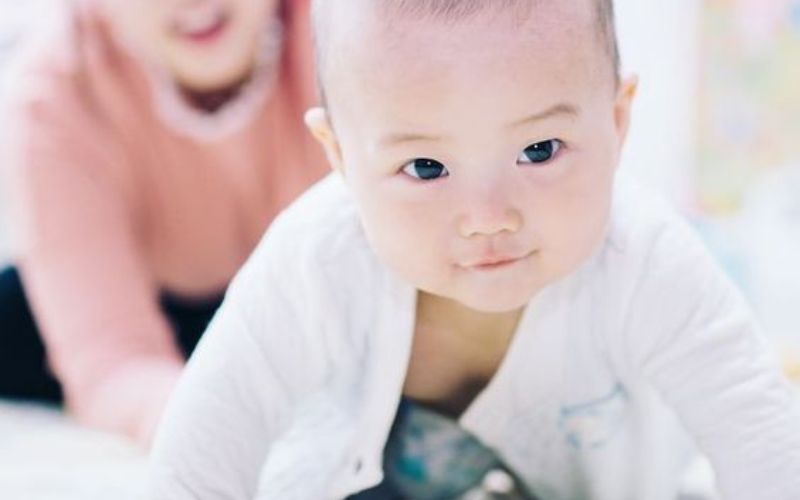
As babies progress through different stages of growth, they achieve various developmental milestones that encompass physical, cognitive, and sensory aspects. Rubbing their eyes can be considered a part of these milestones, particularly in the context of motor skill development, as babies learn to control their hand movements and explore different sensations.
Why Babies Rub Their Eyes as Part of Developmental Milestones?
Fine Motor Skill Development: The act of rubbing their eyes involves the coordination of hand and finger movements. As babies grow, they gradually develop fine motor skills, and activities like rubbing their eyes contribute to this development. It allows them to refine their ability to control and manipulate their fingers with increasing precision.
Hand-Eye Coordination: Rubbing the eyes requires babies to coordinate the movement of their hands with the visual input they receive from their eyes. This action contributes to the development of hand-eye coordination, an essential skill that becomes increasingly refined as they explore their surroundings and interact with objects.
Sensory Exploration: Babies explore the world around them through their senses, including touch. Rubbing their eyes provides a sensory experience as they feel the texture of their eyelids and the gentle pressure on their eyes. This tactile exploration enhances their awareness of different sensations and textures.
Body Awareness: Understanding the connection between their hands and their face is a component of developing body awareness. Rubbing their eyes allows babies to explore this connection, fostering a growing awareness of their own body and its capabilities.
Reflexive to Voluntary Movements: In the early months of life, babies exhibit reflexive movements, but as they grow, they transition to more voluntary and intentional actions. Rubbing their eyes may start as a reflexive response to discomfort or fatigue and gradually evolve into a purposeful and intentional action as they gain control over their motor functions.
Progression in Physical Control: Rubbing their eyes can showcase the progression in physical control as babies gain mastery over their movements. Initially, it might be a somewhat uncoordinated gesture, but with time, babies refine their ability to execute purposeful actions like rubbing their eyes.
Integration into Daily Activities: As part of their developmental milestones, babies integrate various actions into their daily routine. Rubbing their eyes may become a habitual or routine gesture associated with specific needs, such as signaling fatigue or a readiness for sleep.
Recognizing the role of eye rubbing in developmental milestones highlights the interconnected nature of physical and sensory development in infancy.
Caregivers can support this process by providing age-appropriate toys, engaging in interactive play, and creating a safe environment that encourages exploration and motor skill development.
9. Mimicking Behavior

Babies are highly observant and learn by imitating the actions of those around them, particularly adults and older siblings. Rubbing their eyes can be a behavior that babies mimic from their caregivers or siblings, even if they may not have the same underlying reasons for doing so.
Why Babies Mimic Eye-Rubbing Behavior?
Observational Learning: Babies are keen observers from a very early age. They learn by watching the actions and behaviors of the people in their immediate environment. If they witness others, especially adults or older siblings, rubbing their eyes, they may naturally pick up on this action.
Social Bonding: Mimicking behavior is a way for babies to engage in social bonding. By imitating the actions of those around them, they establish a connection and shared experience. Rubbing their eyes in response to seeing someone else do it can be a form of social interaction and bonding.
Imitation as a Learning Tool: Imitation is a powerful learning tool for infants. Through imitation, babies not only learn specific actions but also gain insight into social norms and behaviors. Rubbing their eyes may be a behavior they adopt as part of their learning about social interactions and communication.
Desire for Connection: Babies are social beings who desire connection and interaction with their caregivers and family members. Mimicking behaviors, such as rubbing their eyes, is a way for them to participate in shared activities and feel a sense of inclusion within their social group.
Repetition and Routine: If eye rubbing is a behavior commonly observed in the baby’s environment, it may become part of their routine through repetition. Babies thrive on predictability and routine, and mimicking behaviors like eye rubbing may become a consistent part of their actions.
Lack of Understanding of Context: While babies can imitate actions, they may not always understand the context or reasons behind those actions. They might rub their eyes simply because they’ve seen someone else do it, even if they don’t share the same need for eye rubbing.
Transition to Self-Soothing: Over time, the mimicked behavior may evolve into a self-soothing mechanism for the baby. What initially started as imitation could turn into a learned response for seeking comfort or signaling fatigue.
Caregivers can positively leverage the concept of mimicking by providing intentional modeling of behaviors that align with the baby’s well-being.
If eye rubbing is observed as a mimicry behavior, caregivers can ensure that it does not lead to discomfort or eye irritation and can guide the baby toward appropriate self-soothing actions if needed.
It’s a reminder of the influential role caregivers play in shaping a baby’s early experiences and behaviors.
10. Dry Eyes or Allergies
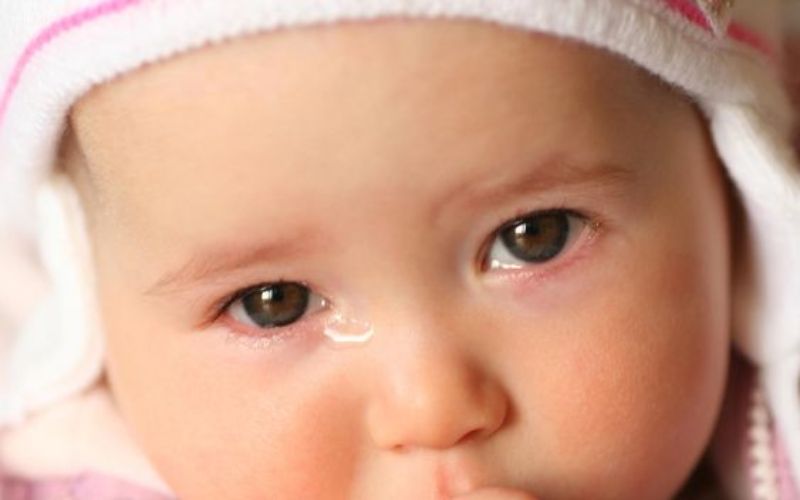
Dry eyes and allergies are common factors that can lead to eye irritation in both adults and babies. When babies experience dry eyes or are exposed to allergens, they may feel discomfort, prompting them to rub their eyes. Various environmental factors, such as dry air or the presence of allergens, can contribute to this behavior.
Why Babies Rub Their Eyes Due to Dry Eyes or Allergies?
Lack of Tear Production: Babies, especially newborns, may have underdeveloped tear ducts, leading to insufficient tear production. Tears play a crucial role in keeping the eyes moist and preventing irritation. When tear production is limited, the eyes can become dry, and babies may rub their eyes to alleviate the discomfort.
Dry Air Conditions: Environmental factors, such as dry air in heated or air-conditioned spaces, can contribute to dry eyes in babies. Lack of moisture in the air can lead to the evaporation of tears more quickly, causing dryness and irritation that may prompt babies to rub their eyes.
Allergens in the Environment: Exposure to allergens, such as pollen, dust, pet dander, or other environmental irritants, can trigger allergic reactions in babies. Allergic reactions often lead to itching and irritation in the eyes, prompting the baby to rub their eyes as a natural response to alleviate the discomfort.
Rubbing as a Reflexive Response: Babies may develop a reflexive response to discomfort in their eyes. If they experience dryness or irritation, rubbing their eyes becomes a reflexive action to address the discomfort, even if they are not consciously aware of the specific cause.
Skin Sensitivity: The skin around the eyes is delicate, and babies may be more susceptible to skin sensitivity. Irritants in the environment, whether allergens or dry air, can lead to skin irritation around the eyes, prompting babies to rub in an attempt to soothe the discomfort.
Seasonal Allergies: Seasonal changes can bring about an increase in allergens in the environment. Babies may be more prone to rubbing their eyes during specific seasons when allergen levels are higher, indicating a possible association with seasonal allergies.
Discomfort from Allergic Reactions: Allergic reactions can cause a range of symptoms, including eye redness, tearing, and itching. Babies may rub their eyes in response to these discomforting symptoms, signaling that they are experiencing an allergic reaction.
Addressing dry eyes or allergies in babies may involve creating a more humid environment, ensuring proper ventilation, and minimizing exposure to potential allergens.
If symptoms persist or worsen, consulting with a pediatrician is recommended to identify the specific cause of eye irritation and determine an appropriate course of action for relief.
FAQ’s
Why do babies rub their eyes so much?
Babies may rub their eyes frequently due to tiredness, eye irritation, teething discomfort, allergies, or as a form of self-soothing.
At what age do babies start rubbing their eyes?
Babies can start rubbing their eyes as early as a few months old, although the exact age may vary depending on individual development.
Is eye rubbing harmful for babies?
While occasional eye rubbing is normal, excessive rubbing or rubbing with force can potentially irritate the delicate skin around the eyes. It’s essential to monitor the frequency and intensity of eye rubbing and consult a pediatrician if concerned.
How can I help my baby if they are rubbing their eyes excessively?
Providing a calm and soothing environment, ensuring proper sleep hygiene, and addressing any underlying issues such as teething discomfort or environmental allergies can help reduce excessive eye rubbing in babies.
Should I be worried if my baby rubs their eyes while eating?
Rubbing their eyes while eating may indicate fatigue or discomfort, but it’s not necessarily a cause for concern. Observing your baby’s behavior and addressing any underlying issues can help promote a comfortable feeding experience.
Can eye rubbing be a sign of vision problems in babies?
While occasional eye rubbing is typically unrelated to vision problems, persistent or one-sided eye rubbing may warrant further evaluation by an eye care professional to rule out any underlying issues.
Wrapping It Up With Tips for Managing Infant Eye Rubbing
- Maintain a Consistent Sleep Routine: Establishing a regular sleep schedule can help prevent overtiredness and reduce the likelihood of excessive eye rubbing due to fatigue.
- Keep the Environment Clean: Minimize exposure to dust, smoke, and other potential irritants in the baby’s environment to reduce eye discomfort.
- Use Humidifiers: Adding a humidifier to the baby’s room can help maintain optimal humidity levels, preventing dryness that may lead to eye irritation.
- Offer Teething Relief: Provide safe teething toys or chilled teething rings to alleviate teething discomfort and discourage excessive eye rubbing.
- Practice Gentle Eye Care: Cleanse the baby’s eyes with a soft, damp cloth to remove any debris or discharge gently. Avoid harsh rubbing or using products not recommended for infant eye care.
